Teradata developers play a key role in managing and optimizing large-scale data warehousing solutions. They work with Teradata databases to ensure data is stored, retrieved, and processed efficiently, supporting business intelligence and analytics needs.
Teradata development skills include proficiency in SQL, understanding of database design and architecture, and experience with ETL (Extract, Transform, Load) processes. Additionally, skills like analytical thinking and attention to detail are important for success in this role.
Candidates can write these abilities in their resumes, but you can’t verify them without on-the-job Teradata Developer skill tests.
In this post, we will explore 8 essential Teradata Developer skills, 10 secondary skills and how to assess them so you can make informed hiring decisions.
Table of contents
8 fundamental Teradata Developer skills and traits
The best skills for Teradata Developers include SQL Proficiency, Data Modeling, Performance Tuning, ETL Processes, Teradata Utilities, Database Administration, Scripting Languages and Data Warehousing.
Let’s dive into the details by examining the 8 essential skills of a Teradata Developer.
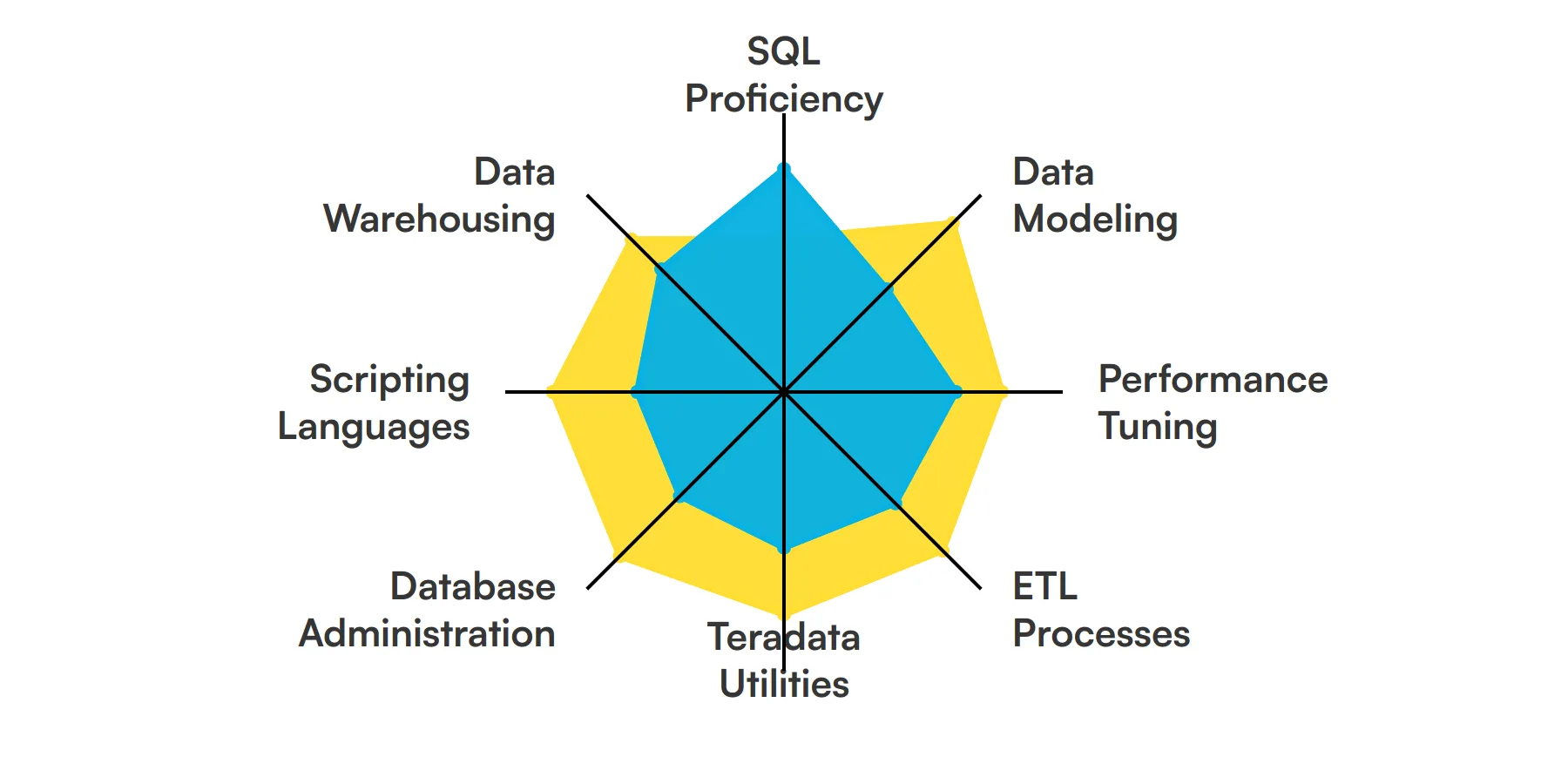
SQL Proficiency
A Teradata Developer must have a strong command of SQL. This skill is essential for writing complex queries, optimizing database performance, and managing data efficiently. SQL is the backbone of any database-related task, making it indispensable for this role.
For more insights, check out our guide to writing a SQL Developer Job Description.
Data Modeling
Understanding data modeling is crucial for designing and implementing database structures. A Teradata Developer uses this skill to create logical and physical data models, ensuring data integrity and optimizing storage. This helps in organizing data in a way that supports business requirements.
Performance Tuning
Performance tuning involves optimizing database queries and configurations to ensure fast and efficient data retrieval. A Teradata Developer needs this skill to identify bottlenecks and improve the overall performance of the database system, making data operations smoother.
ETL Processes
Extract, Transform, Load (ETL) processes are fundamental for data integration. A Teradata Developer uses ETL tools to extract data from various sources, transform it into a suitable format, and load it into the Teradata database. This skill is essential for maintaining data consistency and quality.
Check out our guide for a comprehensive list of interview questions.
Teradata Utilities
Familiarity with Teradata-specific utilities like BTEQ, FastLoad, and MultiLoad is crucial. These tools help a Teradata Developer in performing bulk data operations, scripting, and automating tasks, thereby enhancing productivity and efficiency.
Database Administration
Database administration skills are necessary for managing and maintaining the Teradata environment. This includes tasks like backup and recovery, user management, and security. A Teradata Developer ensures the database is secure, reliable, and available.
For more insights, check out our guide to writing a Database Administrator (DBA) Job Description.
Scripting Languages
Knowledge of scripting languages like Python or Shell scripting can be highly beneficial. A Teradata Developer uses these languages to automate repetitive tasks, manage workflows, and integrate with other systems, thereby streamlining operations.
Data Warehousing
Understanding data warehousing concepts is essential for a Teradata Developer. This includes knowledge of data marts, OLAP, and star schema design. These concepts help in organizing large volumes of data for analysis and reporting.
10 secondary Teradata Developer skills and traits
The best skills for Teradata Developers include Big Data Technologies, Cloud Platforms, Data Visualization, Project Management, Version Control, Data Governance, Business Acumen, API Integration, Security Best Practices and Troubleshooting.
Let’s dive into the details by examining the 10 secondary skills of a Teradata Developer.
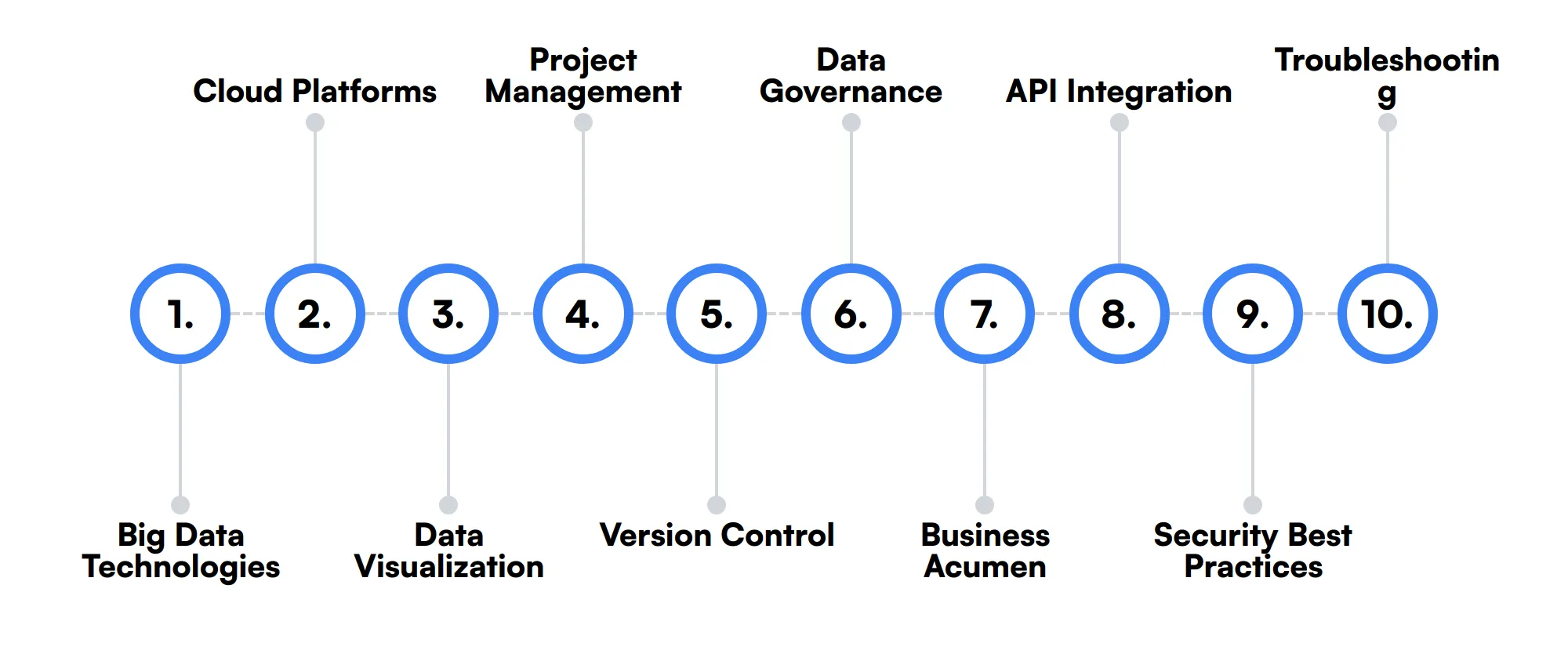
Big Data Technologies
Familiarity with big data technologies like Hadoop and Spark can be advantageous. These skills help a Teradata Developer in handling large datasets and integrating Teradata with big data platforms.
Cloud Platforms
Knowledge of cloud platforms such as AWS, Azure, or Google Cloud can be beneficial. A Teradata Developer may need to deploy and manage Teradata databases in cloud environments, leveraging cloud services for scalability and flexibility.
Data Visualization
Skills in data visualization tools like Tableau or Power BI can enhance a Teradata Developer's ability to present data insights. These tools help in creating interactive dashboards and reports, making data more accessible to stakeholders.
Project Management
Basic project management skills can be useful for a Teradata Developer. This includes understanding project timelines, resource allocation, and task prioritization. These skills help in managing database projects effectively.
Version Control
Knowledge of version control systems like Git is beneficial. A Teradata Developer uses version control to manage changes in database scripts and configurations, ensuring collaboration and maintaining a history of modifications.
Data Governance
Understanding data governance principles is important for ensuring data quality and compliance. A Teradata Developer uses these principles to establish data policies, standards, and procedures, ensuring data is managed responsibly.
Business Acumen
Having a good understanding of the business domain can be advantageous. A Teradata Developer with business acumen can better align database solutions with business goals, ensuring that data supports decision-making processes.
API Integration
Knowledge of API integration can be useful for a Teradata Developer. This skill helps in connecting Teradata with other systems and applications, enabling seamless data exchange and enhancing interoperability.
Security Best Practices
Understanding security best practices is crucial for protecting sensitive data. A Teradata Developer uses these practices to implement encryption, access controls, and other security measures, ensuring data is safeguarded against threats.
Troubleshooting
Strong troubleshooting skills are essential for diagnosing and resolving database issues. A Teradata Developer uses these skills to identify problems, analyze root causes, and implement solutions, ensuring the database operates smoothly.
How to assess Teradata Developer skills and traits
Assessing the skills and traits of a Teradata Developer involves more than just glancing at a resume. It requires a deep understanding of their technical capabilities and how they apply their knowledge in real-world scenarios. The key to a successful assessment lies in evaluating both hard and soft skills effectively.
Given the complexity of skills such as SQL Proficiency, Data Modeling, Performance Tuning, and others, traditional interviews often fall short. This is where practical assessments come into play. By using tailored assessments, you can measure a candidate's ability to handle real-life tasks that they would encounter on the job.
One effective way to streamline this process is by incorporating Adaface assessments into your hiring strategy. These tests are designed to reflect the actual challenges a Teradata Developer might face, ensuring that you can assess candidates on skills that matter the most. With Adaface, companies have seen a 2x improvement in the quality of hires and an 85% reduction in screening time, making it a smart choice for tech-driven companies.
Let’s look at how to assess Teradata Developer skills with these 6 talent assessments.
SQL Online Test
Our SQL Online Test evaluates a candidate's ability to design and build relational databases, manage tables, and write efficient SQL queries including joins and subqueries.
The test assesses skills in CRUD operations, conditional expressions, procedures, views, indexes, and handling of locks and transactions.
Candidates who perform well demonstrate a strong grasp of SQL operations, query optimization, and database security measures.

Data Modeling Skills Test
The Data Modeling Skills Test measures proficiency in database design principles, including SQL, ER diagrams, and normalization.
It evaluates a candidate's ability to create relational schemas, ensure data integrity, and perform data mapping and transformation.
High-scoring individuals show adeptness in both theoretical and practical aspects of data modeling and database design.
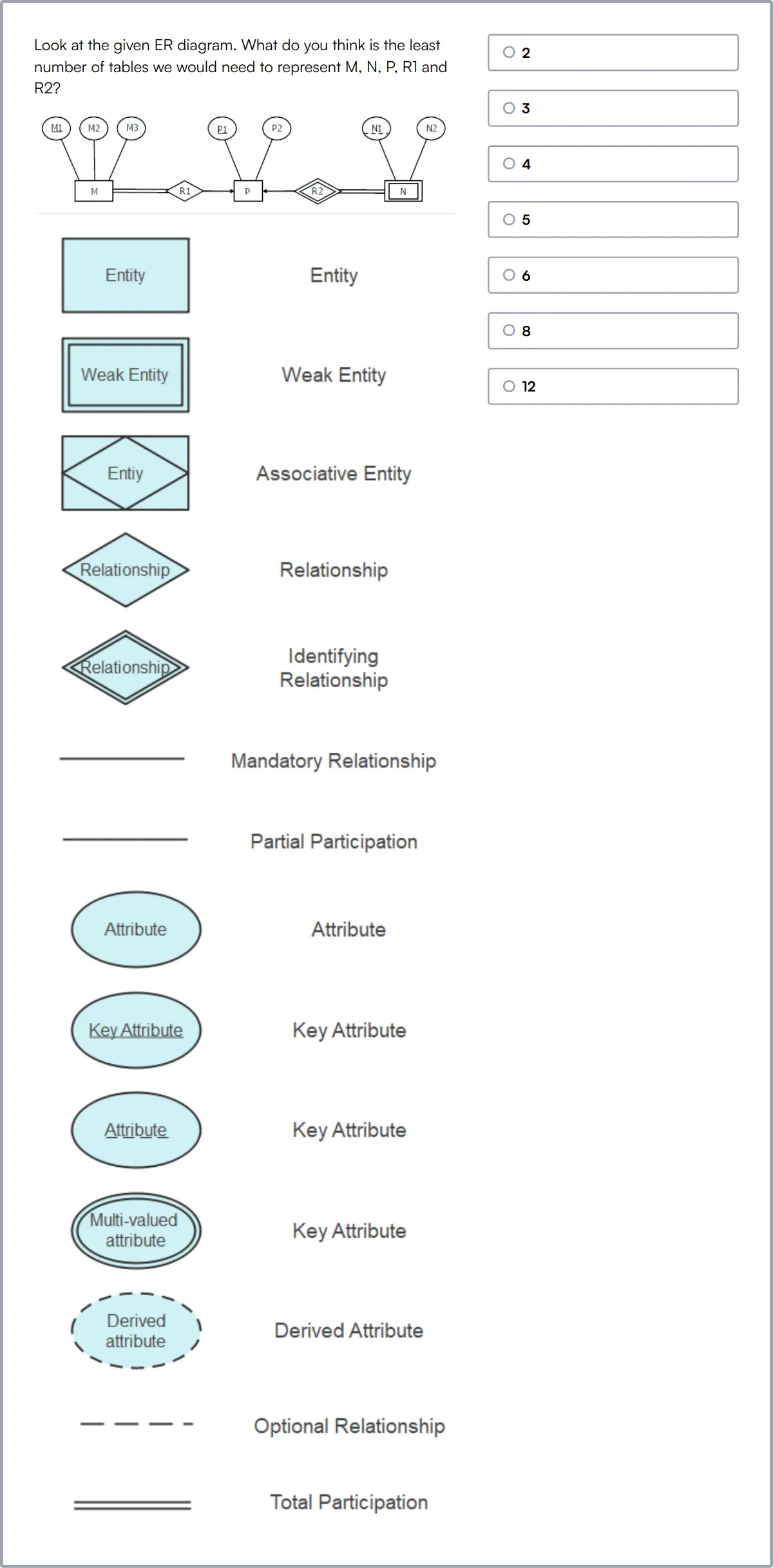
Informatica Online Test
Our Informatica Online Test assesses a candidate's expertise in using PowerCenter for ETL processes and data integration.
The test covers skills in data warehousing, relational database operations, and the use of mapplets, parameterization, workflows, sessions, and tasks.
Successful candidates will demonstrate proficiency in designing and executing complex data transformation and synchronization tasks without relying on SQL.
Teradata Online Test
The Teradata Online Test evaluates knowledge in Teradata Database management, SQL querying, and performance tuning.
This test assesses abilities in data modeling, ETL, data integration, and migration, along with proficiency in Teradata utilities and Teradata Parallel Transporter (TPT).
Candidates excelling in this test are well-versed in optimizing database operations and managing complex data warehousing environments.
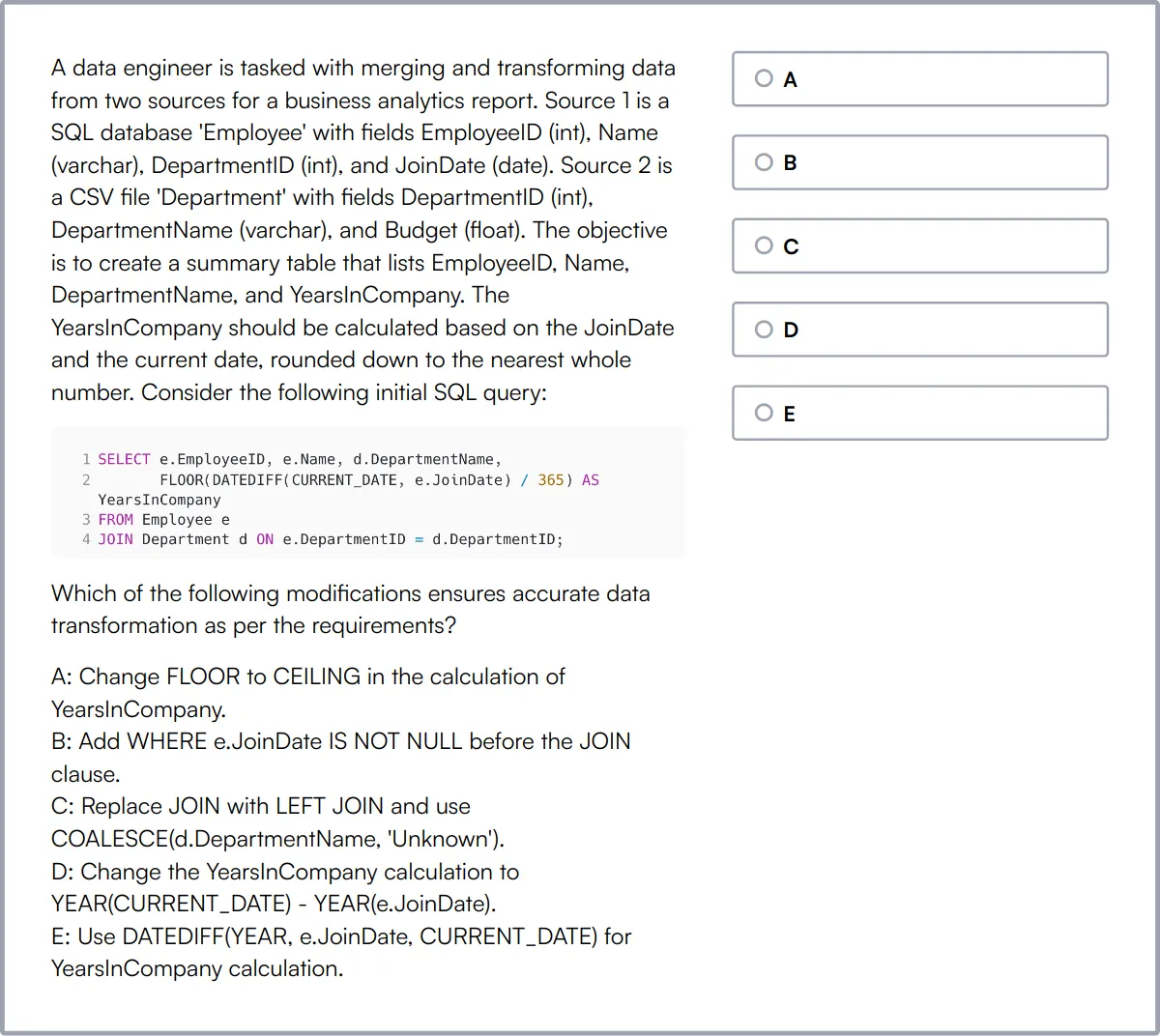
MongoDB Online Test
Our MongoDB Online Test gauges a candidate's ability to design NoSQL schemas in MongoDB and perform CRUD operations effectively.
The test evaluates knowledge in handling MongoDB data types, query language, aggregation framework, and performance optimization techniques like indexing and sharding.
High performers are adept at scaling MongoDB clusters, ensuring fault tolerance, and implementing security measures.
Data Warehouse Online Test
The Data Warehouse Online Test assesses candidates on their expertise in designing and maintaining data warehouses and databases.
It tests knowledge in SQL basics, ETL fundamentals, data modeling, and understanding of fact tables and normalization.
Successful candidates demonstrate the ability to build efficient data storage solutions and handle complex data warehousing tasks.
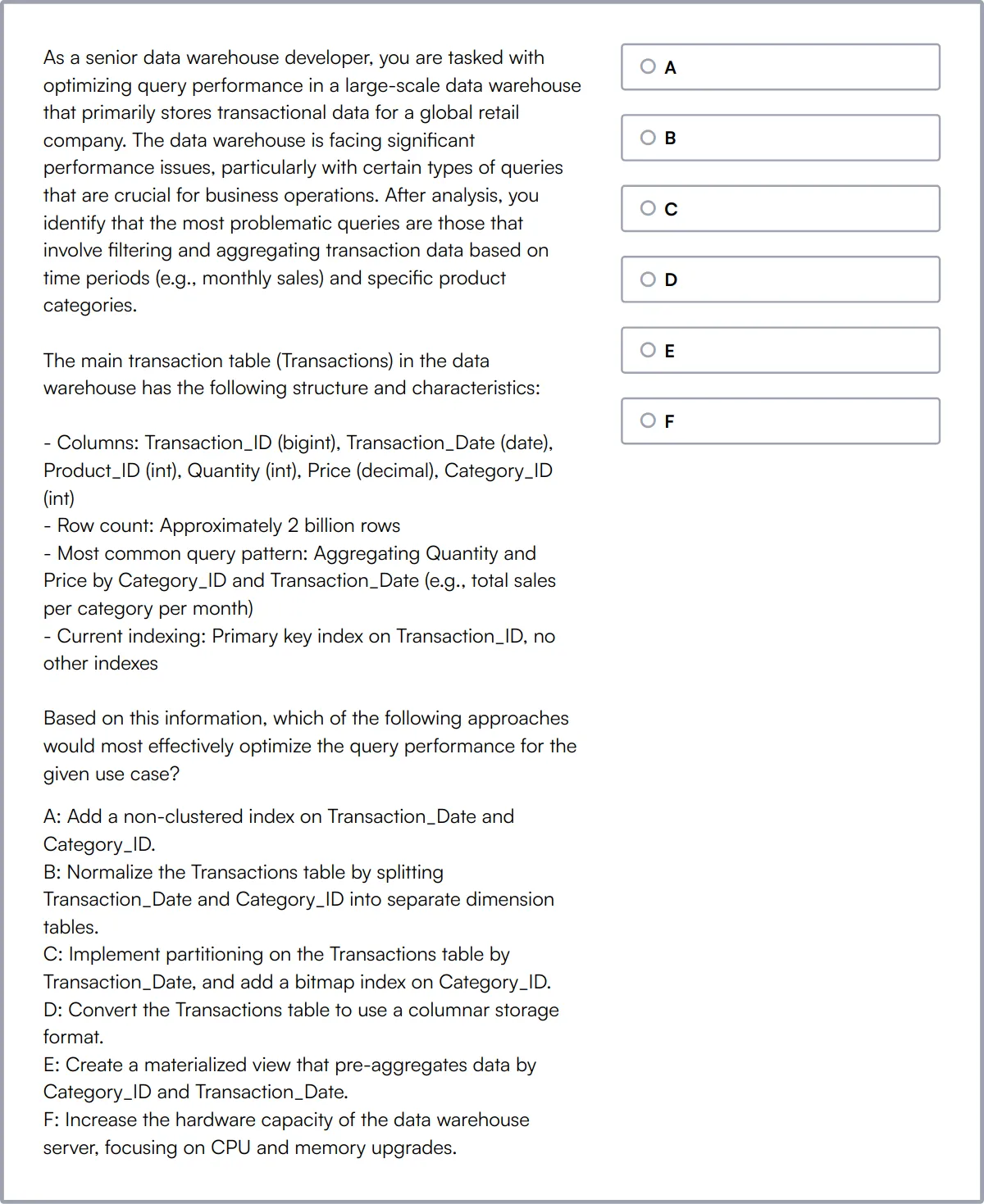
Summary: The 8 key Teradata Developer skills and how to test for them
| Teradata Developer skill | How to assess them |
|---|---|
| 1. SQL Proficiency | Evaluate candidate's ability to write complex queries and optimize them. |
| 2. Data Modeling | Assess understanding of logical and physical model designs. |
| 3. Performance Tuning | Check ability to enhance database performance and efficiency. |
| 4. ETL Processes | Review knowledge of data extraction, transformation, and loading techniques. |
| 5. Teradata Utilities | Test proficiency with Teradata tools like BTEQ, FastLoad. |
| 6. Database Administration | Gauge experience in managing and maintaining databases. |
| 7. Scripting Languages | Determine skill in using scripting for automation and data manipulation. |
| 8. Data Warehousing | Examine experience with large-scale data storage solutions. |
Teradata MDM Online Test
Teradata Developer skills FAQs
What SQL skills should a Teradata Developer possess?
A Teradata Developer should be proficient in writing complex SQL queries, understanding joins, subqueries, and window functions. They should also be familiar with Teradata-specific SQL extensions.
How can I assess a candidate's data modeling skills?
Evaluate their ability to design logical and physical data models, normalize data, and create ER diagrams. Ask for examples of past projects or give them a case study to solve.
What is the importance of performance tuning in Teradata?
Performance tuning ensures that queries run efficiently. Assess candidates by asking about their experience with indexing, partitioning, and query optimization techniques.
Which Teradata utilities should a developer be familiar with?
Key utilities include BTEQ, FastLoad, MultiLoad, FastExport, and TPT. Test their knowledge by asking about use cases and scenarios where each utility is applicable.
How do you evaluate a candidate's experience with ETL processes?
Look for experience with ETL tools like Informatica, Talend, or Teradata's own ETL solutions. Ask them to describe their role in ETL projects and specific challenges they faced.
What scripting languages are useful for a Teradata Developer?
Scripting languages like Python, Shell, and Perl are often used for automation and data manipulation tasks. Assess their proficiency by reviewing code samples or small coding tasks.
Why is knowledge of cloud platforms important for Teradata Developers?
Many organizations are moving to cloud-based solutions. Familiarity with AWS, Azure, or Google Cloud can be crucial. Ask about their experience with cloud migrations or hybrid environments.
How can you assess a candidate's troubleshooting skills?
Present them with common database issues or performance problems and ask how they would diagnose and resolve them. Look for a methodical approach and problem-solving skills.

40 min skill tests.
No trick questions.
Accurate shortlisting.
We make it easy for you to find the best candidates in your pipeline with a 40 min skills test.
Try for freeRelated posts
Free resources



